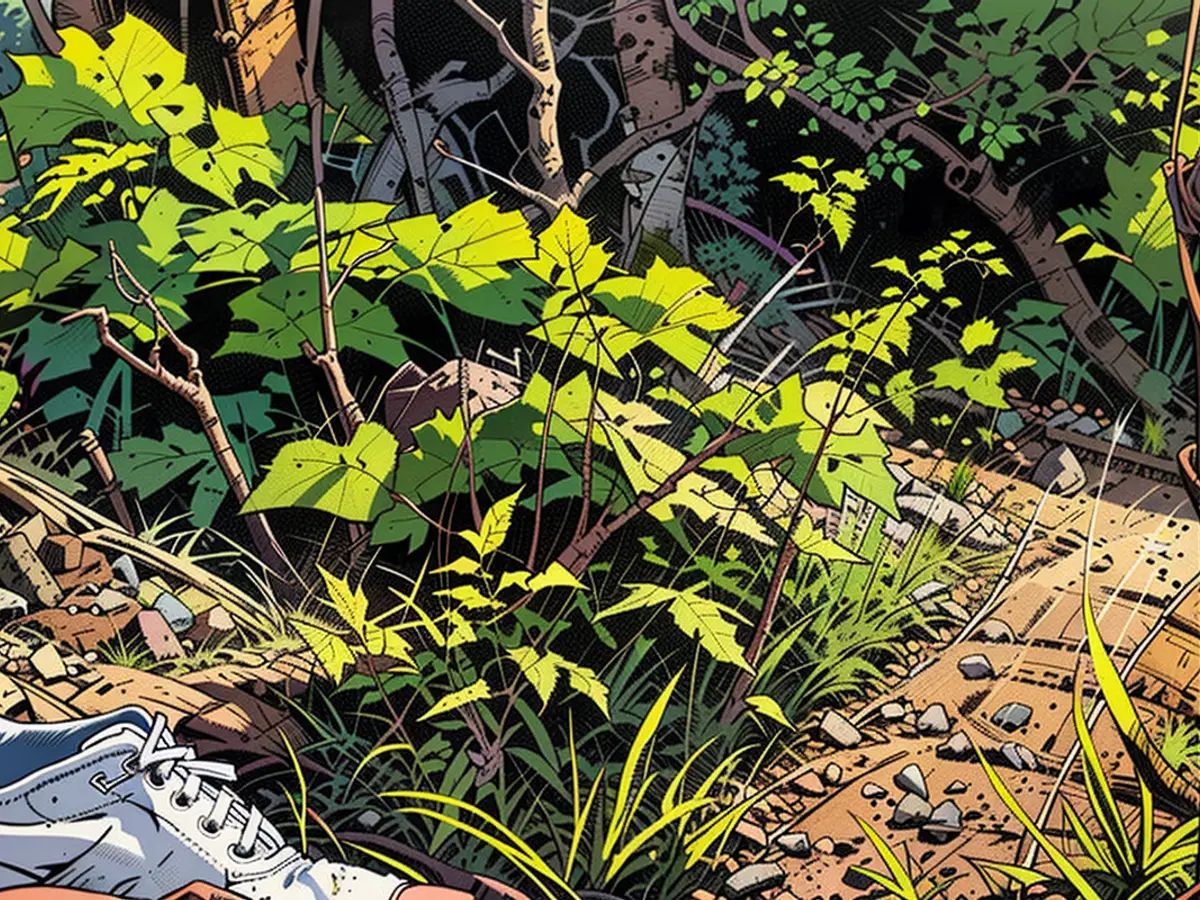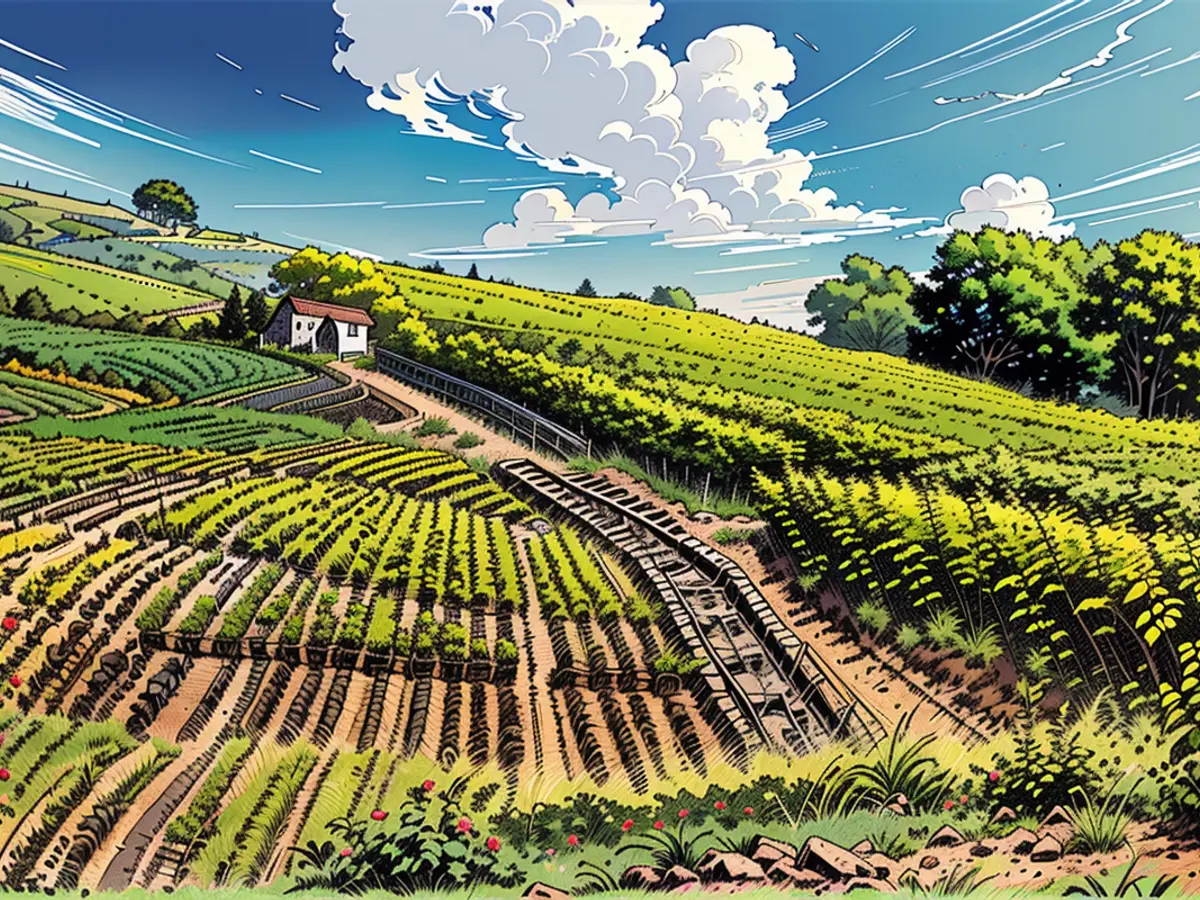Is the southern Region experiencing vine decay?
Vineyards, a blend of leisure and labor, losing their charm.
Lush green rows, punctuated by dry stone walls, make up the landscape. A lizard scurries across the path. Bietigheim-Bissingen, nestled in the Stuttgart metropolitan area, is home to Porsche and Wendelin Wiedeking. The city boasts of its picturesque vineyards, a favorite spot for many strollers, offering a tranquil view of the meandering river.
Vineyards embody the essence of 'recreational areas', a title that falls short of describing them: places that offer an elusive serenity that's often lost by the time one reaches home. For some, it's not just a leisure spot, but a workplace. These individuals are vital for the vineyard's survival, as without them, the vineyard withers away brick by brick.
One such individual is Sophie Roth. It's a Wednesday morning, 7 am, the Bietigheimer Brachberg's sun hasn't risen yet, but Roth is pedaling her way up a gravel path to her vines, accompanied by her friend, water, snacks, and a weed whacker.
A Sixth Less of Vineyards by 2030?
Roth, 24, an agronomy student turned aspiring chef, manages a vineyard while juggling late-night kitchen duties at a renowned Stuttgart restaurant. Today, she's 'de-leafing' vines: the grapes need sunlight to ripen, so the surrounding foliage must be trimmed - but not completely, Roth warns, or the grapes might sunburn.
Roth, a young woman with a zeal for winemaking on slopes, is an anomaly in the industry. The Württemberg Winegrowers' Association's Heinrich Morast, in an interview with ntv.de, describes the situation as follows: "Due to structural change, many winemakers are retiring, and few are taking their place." It's projected that by 2030, over a sixth (around 20 square kilometers) of Württemberg's vineyards could be lost.
In Germany, vineyard areas have seen a slight increase as per the Federal Statistical Office's data. However, in Württemberg, the numbers are shrinking, as shown by data from the State Institute for Viticulture and Fruit Growing (LVWO). Particularly on steep slopes, more and more areas are being abandoned, says Morast.
The topography, what makes the vineyard unique, is also its downfall, amplifying the challenges faced by the wine industry: demographic change and economic pressure. For many older vintners, the physical toll of working on steep slopes becomes too much. Moreover, these areas require more care and are hard for machines to access, resulting in higher costs for the same yield.
"Just Felt Like Giving It a Go"
Interestingly, steep vineyards were once an economic victory for humans over nature: rugged slopes, lined with river valleys, offered plenty of sun but little usable space. Humans tamed the mountain by building stone walls, creating usable areas. Like rivers that humans straighten with dams to make them navigable, but at a higher frequency: some vineyards in Bietigheim-Bissingen have up to 20 walls. Each wall represents a new usable space, usually only one to three meters long, before the next wall follows.
The stairs that wind through the vineyard, connecting different levels, are often mere series of loose stones. That's why Sophie Roth, upon reaching her vines, switches her worn Nike Air shoes for work boots. She'll be on uneven ground for hours, her feet will ache. By evening, she'll have muscle soreness from all the climbing up and down.
She decided to "give it a go" with the vineyard, Roth says in an interview with ntv.de. To put her studies into practice. "And having your own wine is kind of cool too," she adds. She found the vineyard on lease through contacts. She sees herself managing more land post-training, Roth says, as a side job.
However, Philipp Ritz of the LVWO believes that winemaking on steep slopes is often a hobby, family tradition, or idealism. Morast agrees: production costs for wine are too high, price pressure is too high. Few are willing to pay more for wine from steep slopes. Therefore, more and more vineyards are becoming overgrown.
Subsidies Aid the Walls in the Vineyard
If a vineyard collapses and becomes overgrown, if no one tends the vines, prunes them, or repairs walls, it affects other vineyards. Pests and diseases can spread more easily, affecting neighboring areas. The habitat for animals like lizards shrinks, posing a serious problem for the vineyard.
That's why Baden-Württemberg, the state where Bietigheim-Bissingen is located, provides subsidies for manual vineyard work - 3,000 euros per hectare and year. Bietigheim-Bissingen offers financial aid for people who repair walls in the vineyards or clear overgrown areas - about 50,000 euros annually, as per their own statement.
Roth agrees with that. The winegrowers' association prefers an exemption from the minimum wage, preferring customers to pay reasonable prices for wine sourced from Germany's steep slopes at the checkout. Ritz argues that subsidies only delay necessary structural change, which is also vital for the existing vines. Especially in regions with a high amount of Trollinger plantings on steep slopes, this variety is losing its appeal, with less and less demand for it, as Ritz points out, "You've never really reacted to that."
Where is the vineyard headed?
What's in store for the vineyard? It may transform into an orchard in certain areas, offer a safer haven to animals and plants. If summers become more severe and winters milder, it might even evolve into an olive grove. In Baden-Württemberg, there's discussion about covering idle slopes with solar panels. However, this is complex, as vineyards are often designated as protected landscapes.
It's 1 pm, on the Bietigheimer Brachberg, where the sun mercilessly torments Sophie Roth's vineyard, the bare vines, and exposed grapes. The steep slope has been mowed, with wild carrots, chamomile, and wild garlic now lying flat between the vines. While the lavender bushes on the sides are spared, small black burrs stick to Roth's moss-green socks, eliciting a satisfied smile on her sweaty face.
On their way back, Roth and her companion pause suddenly. By the roadside, a laminated sign reads, "Wineyard for sale." Price: Negotiable. They exchange a glance, and drive on for now, but should Roth ever decide to produce more wine in the future, lack of space will no longer be a concern.
The Württemberg Winegrowers' Association highlighted that due to retirement and lack of new winemakers, over a sixth of Württemberg's vineyards could be lost by 2030, which would impact the industry and the habitat for animals like lizards. To maintain the vineyards and prevent their collapse, Baden-Württemberg and Bietigheim-Bissingen provide subsidies for manual vineyard work, wall repairs, and clearing overgrown areas, assisting individuals like Sophie Roth in keeping their vineyards thriving.









